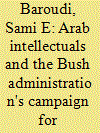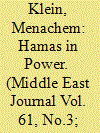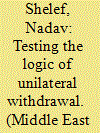| Srl | Item |
| 1 |
ID:
078410


|
|
|
|
|
| Publication |
2007.
|
| Summary/Abstract |
This article considers how Arab intellectuals represent the United States and American foreign policy in their editorial contributions to Arabic newspapers. As a case study, it examines Arab intellectuals' reactions to the George W. Bush Administration's campaign to effect democratic change in the Middle East, as articulated in the Administration's 2004 Greater Middle East Initiative (hereafter GMEI or Initiative). I argue that the predominantly hostile reactions to the GMEI stemmed mainly from a closed and negative image of the United States permeating Arab intellectual circles. This negative image is the product of the history of American policy towards the region and, equally important, of the beliefs, values, and formative experiences of Arab intellectuals. The article concludes by addressing ways to ameliorate this image
|
|
|
|
|
|
|
|
|
|
|
|
|
|
|
|
| 2 |
ID:
078412


|
|
|
|
|
| Publication |
2007.
|
| Summary/Abstract |
This article challenges the static approach to Hamas as a simple fundamentalist organization by analyzing its political documents. It shows that Hamas' Islamist ideology has not prevented it from moving from fundamentalism to radicalism. Hamas has innovated ways of allowing its leaders to declare or acquiesce in political positions that contradict its fundamentalist creed. Hamas accomplished this change in the course of a domestic debate. The international boycott of its government did not create the change - Hamas began to talk in two voices before winning the 2006 elections.
|
|
|
|
|
|
|
|
|
|
|
|
|
|
|
|
| 3 |
ID:
078414


|
|
|
|
|
| Publication |
2007.
|
| Summary/Abstract |
In this article, some conceptual and empirical relations between Islam, sovereignty, and democracy will be examined, with comparisons to Christianity. In the first part of the article, the historical conditions of the formation of the dualist (Christianity) and monist (Islam) political theories of the two religions will be examined. This will be followed by a conceptualization of the beginning and end of their respective "middle ages." It will be argued that the end of the Islamic middle ages was marked, in some Islamic countries, by the following phenomena: the building of a secular state apparatus; the replacement of "religion" by "nation" as the basis of the sovereignty of the new state; the deportation of Islam from the state to society; and the re-birth of Islam in the hands of the social actors as a political ideology aiming at re-capturing the state it had lost. In the final sections, the problematic relationship between secularization and democratization in the Islamic world will be examined, and the experiments with secularization in the Islamic world will be compared with those of France. It will be observed that what made secularization and democracy compatible in France was a combination of historical factors (the existence of the Church that controlled the social manifestations of religion; the state's success in nation-building; the efficiency of the secular judicial system; and the state's satisfactory performance in the area of socioeconomic development), which were largely absent in the Islamic contexts, with the possible exception of Turkey.
|
|
|
|
|
|
|
|
|
|
|
|
|
|
|
|
| 4 |
ID:
078413


|
|
|
|
|
| Publication |
2007.
|
| Summary/Abstract |
The combination of pessimism regarding the possibility of a negotiated settlement and a recognition that maintaining the status quo in the Occupied Territories is impossible has led leading Israeli policymakers to advocate a policy of unilateral withdrawal. This policy is at least partially based on the assumption that nationalist movements inevitably adapt to externally imposed realities. However, as this article demonstrates, even the famously pragmatic Labor Zionist movement did not shift its vision of the appropriate borders of their state in response to externally imposed territorial limits. Rather, when such ideological transformations took place, they were more closely linked to the contingencies of domestic and intra-movement politics. Unilateral withdrawals are thus unlikely to contribute to a resolution of the conflict between Israel and the Palestinians, in part, because they are animated by a faulty assumption about the mechanism of ideological transformation
|
|
|
|
|
|
|
|
|
|
|
|
|
|
|
|
| 5 |
ID:
078411


|
|
|
|
|
| Publication |
2007.
|
| Summary/Abstract |
This article focuses on the Axis of Evil metaphor that was used by President George W. Bush in his State of the Union Address in 2002 to represent Iran, Iraq, and North Korea. After describing "axis" as a metonym for fascism and Nazism, and "evil" as a metonym for Satanic forces that implies an alliance of Iran, Iraq, and North Korea that is collectively responsible for evil deeds, the authors analyze the impact of this metaphor on Iranian self-image and politics. The data for this analysis are drawn from in-depth interviews conducted with 18 members of the Iranian oppositional elite. The interview results suggest that the Axis of Evil metaphor had an impact on political discourse in Iran and strengthened the rhetorical position of conservatives vis-à-vis reformers by reviving militant revolutionary language with the Great Satan (the United States) as the main target of the theocratic and conservative forces. The article concludes with some observations about the implications of using cultural and historical experiences for explaining differences between the ways in which Americans (and other people in the West) and Iranians have understood the metaphor
|
|
|
|
|
|
|
|
|
|
|
|
|
|
|
|